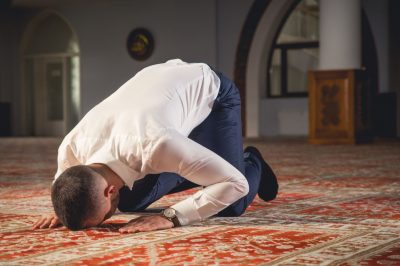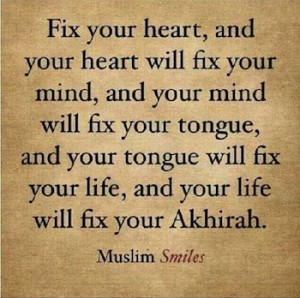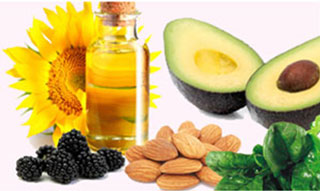Who Does Allah Love?
In the Qur’an, Allah mentions 8 types of believers whom He loves.
Who are they?
This short video produced by About Islam.net lists a total of 13 verses for these 8 types of believers…
Starting with repentance …
Those Who Are Constantly Repentant
Allah loves those who are constantly repentant …
They are mentioned once in the Qur’an in verse (2:222)
Allah (SWT) says:
{And they ask you about menstruation. Say, “It is harm, so keep away from wives during menstruation. And do not approach them until they are pure. And when they have purified themselves, then come to them from where Allah has ordained for you. Indeed, Allah loves those who are constantly repentant and loves those who purify themselves.} (2:222)
Those Who Purify Themselves
Allah loves those who purify themselves (Al-Mutatahereen)
They are mentioned twice in the Qur’an.
Once in the same verse (2:222)
{Indeed, Allah loves those who are constantly repentant and loves those who purify themselves.} (2:222)
And the second time (Al-Mutahereen) in verse (9:108)
{Do not stand [for prayer] within it – ever.
A mosque founded on righteousness from the first day is more worthy for you to stand in.
Within it are men who love to purify themselves; and Allah loves those who purify themselves.} (9:108)
The Doers of Good
Allah loves Ihsan in all matters, and He loves the doers of good (Al-Muhsineen)
They are mentioned three times in the Qur’an.
The first time is in verse (2:195)
Allah (SWT) says:
{And spend in the way of Allah and do not throw [yourselves] with your [own] hands into destruction [by refraining]. And do good; indeed, Allah loves the doers of good.} (2:195)
The second time they are mentioned is in verse (5:13)
Allah (SWT) says:
{So for their breaking of the covenant We cursed them and made their hearts hard. They distort words from their [proper] usages and have forgotten a portion of that of which they were reminded. And you will still observe deceit among them, except a few of them. But pardon them and overlook [their misdeeds]. Indeed, Allah loves the doers of good.} (5:13)
The third time they are mentioned is in verse (5:93)
Allah (SWT) says:
{There is not upon those who believe and do righteousness [any] blame concerning what they have eaten [in the past] if they [now] fear Allah and believe and do righteous deeds, and then fear Allah and believe, and then fear Allah and do good; and Allah loves the doers of good.} (5:93)
The Righteous (who fear Him)
Allah loves the righteous (who fear Him) (Al-Muttakeen)
They are mentioned three times in the Qur’an.
The first time is in verse (3:76)
Allah (SWT) says:
{But yes, whoever fulfills his commitment and fears Allah – then indeed, Allah loves those who fear Him.} (3:76)
The second time is in verse (9:4)
Allah (SWT) says:
{Excepted are those with whom you made a treaty among the polytheists and then they have not been deficient toward you in anything or supported anyone against you; so complete for them their treaty until their term [has ended].
Indeed, Allah loves the righteous [who fear Him].} (9:4)
The third time is in verse (9:7)
Allah (SWT) says:
{How can there be for the polytheists a treaty in the sight of Allah and with His Messenger, except for those with whom you made a treaty at al-Masjid al-Haram?
So as long as they are upright toward you, be upright toward them.
Indeed, Allah loves the righteous [who fear Him].} (9:7)
Those who rely upon Him
Allah loves those who rely upon Him (Al-Mutawakeleen)
They are mentioned once in the Qur’an. Allah (SWT) says:
{So by mercy from Allah, [O Muhammad], you were lenient with them.
And if you had been rude [in speech] and harsh in heart, they would have disbanded from about you.
So pardon them and ask forgiveness for them and consult them in the matter.
And when you have decided, then rely upon Allah. Indeed, Allah loves those who rely [upon Him].} (3:159)
Those who act justly
Allah loves justice and those who act justly (Al-Muqsiteen)
They are mentioned three times in the Qur’an.
The first time is in verse (5:42). Allah (SWT) says:
{[They are] avid listeners to falsehood, devourers of [what is] unlawful. So if they come to you, [O Muhammad], judge between them or turn away from them.
And if you turn away from them – never will they harm you at all.
And if you judge, judge between them with justice.
Indeed, Allah loves those who act justly.} (5:42)
The second time is in verse (49:9)
Allah (SWT) says:
{And if two factions among the believers should fight, then make settlement between the two.
But if one of them oppresses the other, then fight against the one that oppresses until it returns to the ordinance of Allah.
And if it returns, then make settlement between them in justice and act justly.
Indeed, Allah loves those who act justly.} (49:9)
The third time is in verse (60:8)
Allah (SWT) says:
{Allah does not forbid you from those who do not fight you because of religion and do not expel you from your homes – from being righteous toward them and acting justly toward them.
Indeed, Allah loves those who act justly.} (60:8)
The Steadfast
Allah loves patience and He loves the steadfast (Al-Sabireen)
They are mentioned once in the Qur’an.
Allah (SWT) says:
{And how many a prophet [fought and] with him fought many religious scholars.
But they never lost assurance due to what afflicted them in the cause of Allah, nor did they weaken or submit.
And Allah loves the steadfast.} (3:146)
Those who fight in His cause as one row
Allah loves those who fight in His cause as one row
They are mentioned once in the Qur’an.
Allah (SWT) says:
Indeed, Allah loves those who fight in His cause in a row as though they are a [single] structure joined firmly. (61:4)
May Allah (SWT) make us among those whom He loves
Ameen
(From Discovering Islam archive)
The post What Are the 8 Qualities Allah Loves in the Believer? appeared first on About Islam.
source
https://aboutislam.net/reading-islam/who-does-allah-love/
 Read Also: Maintaining Fasting as Habit After Ramadan
Read Also: Maintaining Fasting as Habit After Ramadan























